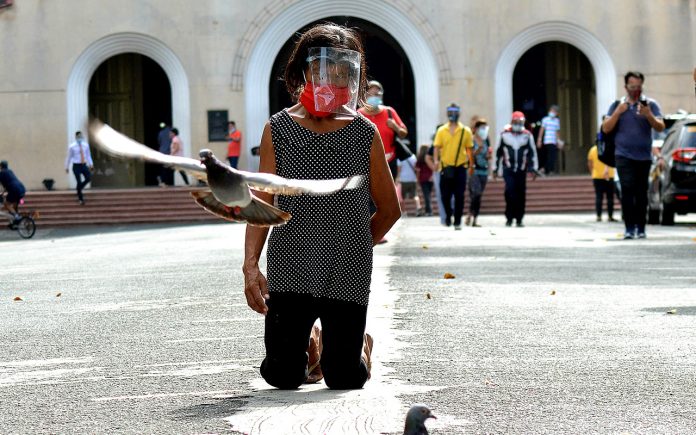Reflection for the 33rd Sunday in Ordinary Time (Cycle C)
In the context of everyday living – amid all its complexities and ambiguities as well as the anxieties that come with it – we may often find ourselves asking this most fundamental question: How can we be holy? How can we effectively respond to the call of our Lord’s divine love, and refuse to be one among the many “proud and evildoers” who will one day, he warns, be “burned, like straw in the fire”? How do we authentically “respect our Lord’s name”, and hope for the morrow, when “the sun of justice will shine upon us” forever?
Is everyday living a far more difficult burden today than ever before, weighing heavily against the pursuit of heroic virtue, and now a convenient excuse for ‘not striving to be holy’? Or is holiness only possible when one can successfully escape from the stress and tempting allurements of everyday living? Are they two irreconcilable poles of human existence, of which one must be irreversibly chosen over the other?
In Gaudete et exsultate, our Holy Father Francis succinctly exhorts us, “… We are all called to be holy by living our lives with love and by bearing witness in everything we do, wherever we find ourselves. Are you called to the consecrated life? Be holy by living out your commitment with joy. Are you married? Be holy by loving and caring for your husband or wife, as Christ does for the Church. Do you work for a living? Be holy by laboring with integrity and skill in the service of your brothers and sisters. Are you a parent or grandparent? Be holy by patiently teaching the little ones how to follow Jesus. Are you in a position of authority? Be holy by working for the common good and renouncing personal gain.” (GE, 14)
Holiness therefore, not only can it be achieved, but it must inevitably be undertaken within the context of everyday living, if this mission of spreading the message of love and mutual responsibility is to have any meaning for our troubled world. Only acts of holiness can transform and sanctify everyday living. In this sense, the Apostle is correct in admonishing the servants of the kingdom of God to follow their example “to work and earn their own living … so as not to be a burden to anybody else.” Holiness has never been meant to be sustained without a struggle. It is a daily encounter with the challenge to share ourselves unconditionally in the midst of conflict and persecution, caused by the selfishness and pride within the oppressive social structures we created out of it.
But holiness must also be conceived to go beyond grand and majestic projects or ventures, simply a life filled with charity expressed in “small gestures” (GE, 16), simply “a more perfect way of doing what we are already doing …” (GE, 17). It does not require a ‘dramatic display of self-giving’ which hardly anyone can emulate, only a daily promise to be our best in doing good and avoiding evil in every task or assignment, without any predetermined ‘holiness plans or agendas’; and to be our best in responding to the needs of the times whatever they are, anytime, anyplace.
So, if ‘everyday holiness’ is clearly a calling for everybody, need we worry?
Pope Francis reassures us, “Let the grace of your baptism bear fruit in a path of holiness… Do not be dismayed, for the power of the Holy Spirit enables you to do this, and holiness, in the end, is the fruit of the Holy Spirit in your life. When you feel the temptation to dwell on your own weakness, raise your eyes to Christ crucified and say: ‘Lord, I am a poor sinner, but you can work the miracle of making me a little bit better’”. (GE, 15)
And the Christ consoles us, “don’t be frightened; for all these things must happen first …” He further encourages us, “This will be your opportunity to bear witness”, but “do not worry in advance about what to say, for I will give you words and wisdom that none of your opponents will be able to withstand or contradict.” Our Lord pledges, “By our patient endurance … not a hair of our heads will perish.”
May we pray:
Father, you are grace! Only you can lead me to yourself!
Grant me the humility to follow this “everyday holiness”, to appreciate the simple things in life which bear witness to your greatness and to see the “ordinariness” in all of us; and grant me too your wisdom that we may understand the depth of human dignity in each of us, that we may realize that each person is special in your eyes and should also be special in mine.
Close my mind from the evil of selfishness, seal my lips from the wrath of intense loathing; and open my heart and my ears to the sufferings around me so that I may reach out my hands to those who are in need of another chance to live again! Amen.
Brother Jess Matias is a professed brother of the Secular Franciscan Order. He serves as minister of the St. Pio of Pietrelcina Fraternity at St. Francis of Assisi Parish in Mandaluyong City, coordinator of the Padre Pio Prayer Groups of the Capuchins in the Philippines and prison counselor and catechist for the Bureau of Jail Management and Penology.
The views expressed in this article are the opinions of the author and do not necessarily reflect the editorial stance of LiCAS.news.









